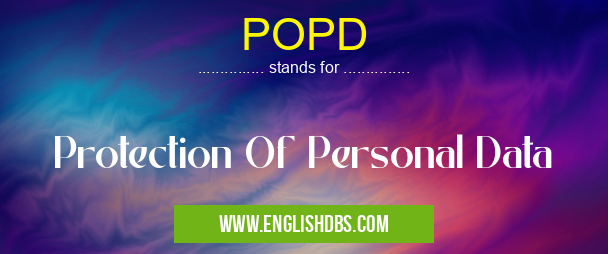What does POPD mean in UNCLASSIFIED
POPD (Protection of Personal Data) refers to the measures and regulations implemented to safeguard and protect the personal information of individuals. It involves the establishment of laws, policies, and practices that govern the collection, use, and disclosure of personal data. The primary goal of POPD is to ensure that individuals have control over and are informed about the handling of their personal information.

POPD meaning in Unclassified in Miscellaneous
POPD mostly used in an acronym Unclassified in Category Miscellaneous that means Protection Of Personal Data
Shorthand: POPD,
Full Form: Protection Of Personal Data
For more information of "Protection Of Personal Data", see the section below.
POPD Meaning in MISCELLANEOUS
In the context of Miscellaneous, POPD pertains to the category of data privacy and protection. It encompasses the legal and ethical frameworks designed to protect the personal information of individuals in various sectors and activities. POPD measures address issues such as data security, data breaches, and the rights of individuals to access, correct, or request the erasure of their personal data.
Key Features of POPD
- Data Collection: POPD establishes guidelines for the lawful and ethical collection of personal data. It requires organizations to obtain explicit consent from individuals before collecting their personal information.
- Data Usage: POPD regulates the use of personal data for specific, legitimate purposes. It prohibits organizations from using personal data for purposes other than those for which it was collected.
- Data Disclosure: POPD imposes restrictions on the disclosure of personal data. It requires organizations to only disclose personal data to authorized parties and for specific purposes.
- Data Storage and Security: POPD mandates organizations to securely store and protect personal data from unauthorized access, use, or disclosure. It requires the implementation of appropriate technical and organizational security measures.
- Individual Rights: POPD empowers individuals with rights to access, correct, or request the deletion of their personal data. It also grants individuals the right to object to the processing of their personal data.
Essential Questions and Answers on Protection Of Personal Data in "MISCELLANEOUS»UNFILED"
What is the Protection of Personal Data (POPD)?
POPD is a set of regulations that aim to protect the personal data of individuals, giving them control over their information and ensuring its responsible use.
Why is POPD important?
POPD is crucial because it safeguards individuals' privacy and prevents the misuse of their personal information. It promotes transparency, accountability, and fairness in the processing of personal data.
What types of personal data does POPD protect?
POPD covers a wide range of personal data, including:
- Name and identity
- Contact information (e.g., address, email, phone number)
- Biometric information
- Health information
- Financial information
- Political and religious affiliations
- Sensitive information (e.g., race, ethnicity, sexual orientation)
Who is responsible for complying with POPD?
All organizations that process personal data, regardless of their size or industry, are responsible for complying with POPD. This includes businesses, government agencies, non-profit organizations, and individuals.
What are the key principles of POPD?
The key principles of POPD include:
- Lawfulness, fairness, and transparency
- Purpose limitation
- Data minimization
- Accuracy
- Storage limitation
- Integrity and confidentiality
- Accountability
What are the penalties for non-compliance with POPD?
Non-compliance with POPD can result in significant penalties, including fines, imprisonment, and reputational damage.
How can I protect my personal data under POPD?
Individuals can protect their personal data by:
- Being aware of their rights and responsibilities
- Carefully reviewing privacy policies before providing personal data
- Limiting the amount of personal data they share
- Using strong passwords and security measures
- Regularly monitoring their credit reports and financial information
- Reporting any unauthorized use of their personal data
Final Words: POPD plays a crucial role in protecting the privacy and rights of individuals in today's digital age. By establishing clear guidelines and regulations, POPD ensures that personal data is handled responsibly, ethically, and in accordance with the law. Adhering to POPD measures helps organizations build trust with their customers, enhance data security, and mitigate the risks associated with data breaches and privacy violations.
POPD also stands for: |
|
| All stands for POPD |
